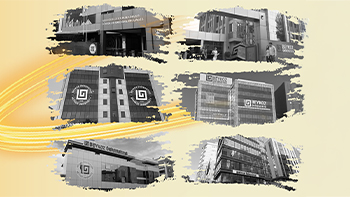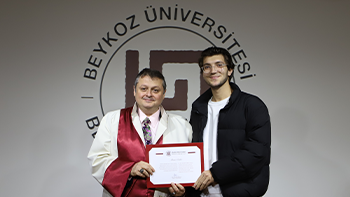
Welcome to the Logistics Management (English) Program!
Our program is designed for students who aim to work in logistics service providers as well as in other parties along the supply chain such as suppliers, manufacturers, wholesalers, and retailers. We aim to provide our students with a strong academic foundation, a global vision, and the practical skills necessary for success in the field of logistics.
Mission
The mission of the Logistics Management (English) Program is to educate individuals who are equipped with ethical values, can think with a global perspective, possess strong analytical skills, and are able to integrate technological advancements into decision-making processes. Our goal is to train professionals and researchers who can design global supply chain networks, provide innovative solutions to problems in logistics operations, and develop logistics and supply chain strategies.
Vision
The vision of our program is to become an internationally recognized academic program that blends a liberal and innovative educational approach with practical applications, raising individuals who can confidently and competently respond to the changing needs of the logistics sector throughout the supply chain.
Scope of the Logistics Management (English) Program
Our curriculum covers the core fields of business and management, international trade, logistics and supply chain management, quantitative methods, and management and logistics information systems. It offers practice-oriented content enriched with interdisciplinary skills.
The program focuses on five main subfields:
-
Business and Management: Provides practical knowledge and skills related to the business world such as strategic management, financial management, cost accounting, and innovation management.
-
International Trade: Covers topics such as international trade theories, trade policies, regional trade agreements, and foreign trade and customs legislation.
-
Logistics and Supply Chain Management: Focuses on supply chain management, international logistics strategies, transportation and distribution systems, warehouse and inventory management. This field plays a key role in understanding the physical flow of goods and services along the global supply chain.
-
Operations Research: Aims to equip students with the ability to optimize transportation and inventory management within the scope of supply chain management.
-
Management and Logistics Information Systems: Highlights the importance of management information systems in the digitalized world and aims to enable students to use technologies applied in logistics.
Additionally, our program allows students to take elective courses from other departments according to their interests, offering an interdisciplinary learning experience.
Click here for detailed course descriptions and ECTS information.
Academic Staff
Our academic staff consists of faculty members with strong research backgrounds and extensive field experience in addition to their teaching expertise.
Click here to learn more about our academic staff and their publications.
Through Beykoz Talks podcast series with our faculty members, we discuss a wide range of topics from academic research areas to current developments. You can listen to our podcasts from the link below:
Prof. Dr. Ezgi Uzel Aydınocak – Navigating a Career in Logistics Management
Program Learning Outcomes
Program Learning Outcomes (PLOs) define the knowledge, skills, and competencies expected of students who successfully complete the program. The PLOs of this program are as follows:
-
Evaluate the core functions required in business management and trade.
-
Explain theoretical knowledge related to logistics management.
-
Assess the supply chain process in all its dimensions.
-
Explain purchasing and supplier relationship management.
-
Follow national and international legislative regulations.
-
Acquire knowledge to carry out logistics activities such as transportation, warehousing, inventory management, order management, material handling, packaging, and labeling.
-
Plan logistics operations in management information systems.
-
Apply theoretical knowledge through a semester-long workplace practice.
-
Implement project management steps to solve real-life business problems.
-
Communicate in a foreign language (English) at a minimum of B2 level as defined in the European Language Portfolio.
-
Follow digitalization processes and developments in logistics operations.
-
Project theoretical knowledge in teamwork and present in public settings.
-
Analyze and interpret theoretical knowledge in the field using analytical methods.
-
Develop awareness of corporate social responsibility and sustainability.
Program Educational Objectives
Program Educational Objectives (PEOs) define the goals expected of graduates a few years after graduation in their professional and/or academic careers. The PEOs of this program are:
-
To have strong knowledge and competence in logistics and supply chain management.
-
To produce solutions to logistics-related problems throughout the supply chain using analytical methods and modern information technologies.
-
To have knowledge and competence in business management in order to meet the requirements of international trade.
-
To possess 21st-century skills in line with business world expectations.
-
To plan, coordinate, and manage logistics processes along the supply chain through hands-on training.
Program-Specific Criteria
-
By taking courses in warehouse management, transportation management, inventory management, procurement, and contract management, students gain the competencies required by program-specific criteria.
-
By taking information systems courses in logistics management, students gain the ability to apply relevant software in logistics operations.
PÖÖ1: Students are equipped with theoretical knowledge in the core functions of logistics such as warehouse management, transportation management, inventory management, procurement, and contract management, and gain practical skills in the sector.
PÖÖ2: Students are equipped with theoretical knowledge in logistics information systems and gain practical skills in applying these systems in the sector.
Alumni
Our program has been graduating students since the 2022–2023 academic year. With the Career Planning course offered in the first year, Career Days that bring together industry representatives and alumni with students, and the activities of the Career Center, our university supports students in planning their careers.
Click here for more information about the Career Center.
Practical Training Process
Our students have the opportunity to put their theoretical knowledge into practice through the Workplace Practice Training in the final year. Many of our graduates receive job offers from the institutions where they complete this training, and all report that the experience has positively influenced both their personal development and their job search process.
English Medium Instruction
The language of instruction in our program is English. Students without sufficient English proficiency must complete a one-year English Preparatory Program before starting the curriculum. Following the preparatory year, delivered by an experienced and specialized faculty, students take all their courses in English and gain comprehensive knowledge of both the corporate and applied frameworks of Logistics Management.
Click here for detailed information about exemption from the English Preparatory Program.
Second Foreign Language Opportunities
For students who wish to learn an additional foreign language besides English, elective courses in other languages are offered.
International Exchange Programs
Through partnerships with universities abroad, our students benefit from exchange programs and international scholarships. Students particularly make active use of the Erasmus+ program.
Our Erasmus+ partner universities include:
-
Hanze University of Applied Sciences (Netherlands)
-
Riga Technical University (Latvia)
-
Utenos Kolegija (Lithuania)
-
Universitatea Alexandru Ioan Cuza din Iasi (Romania)
-
Tomori Pal College (Hungary)
-
University of Tetovo (North Macedonia)
-
Panteion University (Greece)
-
Higher Institute of Insurance and Finance (Bulgaria)
-
Technical University of Varna (Bulgaria)
-
Università degli Studi dell’Aquila (Italy)
Click here for detailed information about Erasmus+.
Click here to watch the Erasmus+ introduction video.
Double Major and Minor Opportunities
Within the framework of bilateral agreements, our students can pursue double majors and minors with other departments of the university.
Research Opportunities
Students interested in academic research can participate voluntarily or on a paid basis in faculty members’ research projects, or apply for TÜBİTAK supports under the supervision of faculty advisors.
Student Clubs
There are numerous student clubs at our university. The Logistics Club, founded by our program’s students, provides opportunities for socializing, taking initiative, and expressing creativity.
Events
Our program organizes conferences, seminars, panels, industry meetings, technical visits, and brand courses with guest experts. These activities provide students with knowledge and career opportunities in areas such as business management, entrepreneurship, leadership, start-ups, trade, logistics, supply chains, retail, and career planning. Additionally, departmental advisory board meetings with representatives from academia, industry, and alumni ensure that the program remains up-to-date and dynamic.
Graduate Education Opportunities
Under the Institute of Graduate Programs, two master’s programs are offered within the Department of International Trade and Finance (English):
-
International Trade and Logistics (Thesis)
-
International Trade and Logistics (Non-Thesis)
-
International Trade and Logistics Distance Education (Non-Thesis)
Click here for more information about our graduate programs.
This content was updated on 22/01/2026.






